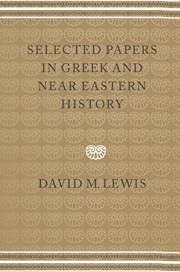Book contents
- Frontmatter
- Contents
- List of plates
- Preface
- Systems of reference
- GENERAL
- ATHENIAN
- 9 Public property in the city
- 10 Cleisthenes and Attica
- 11 Review of J. S. Traill, The Political Organization of Attica
- 12 Review of P. Siewert, Die Trittyen Attikas und die Heeresreform des Kleisthenes
- 13 The Kerameikos ostraka
- 14 Megakles and Eretria
- 15 The Athenian Coinage Decree
- 16 Athena's robe
- 17 The treaties with Leontini and Rhegion
- 18 Entrenchment-clauses in Attic decrees
- 19 Apollo Delios
- 20 After the profanation of the Mysteries
- 21 Aristophanes and politics
- 22 Who was Lysistrata?
- 23 A note on IG i2114 [= i3105]
- 24 The epigraphical evidence for the end of the Thirty
- 25 The financial offices of Eubulus and Lycurgus
- 26 The dating of Demosthenes' speeches
- 27 Law on the Lesser Panathenaia
- 28 The Athenian Rationes Centesimarum
- 29 The chronology of the Athenian New Style Coinage
- 30 Review of M. Thompson, The New Style Silver Coinage of Athens
- NEAR EASTERN
- Bibliography
- Publications of David M. Lewis
- Indexes
15 - The Athenian Coinage Decree
Published online by Cambridge University Press: 15 January 2010
- Frontmatter
- Contents
- List of plates
- Preface
- Systems of reference
- GENERAL
- ATHENIAN
- 9 Public property in the city
- 10 Cleisthenes and Attica
- 11 Review of J. S. Traill, The Political Organization of Attica
- 12 Review of P. Siewert, Die Trittyen Attikas und die Heeresreform des Kleisthenes
- 13 The Kerameikos ostraka
- 14 Megakles and Eretria
- 15 The Athenian Coinage Decree
- 16 Athena's robe
- 17 The treaties with Leontini and Rhegion
- 18 Entrenchment-clauses in Attic decrees
- 19 Apollo Delios
- 20 After the profanation of the Mysteries
- 21 Aristophanes and politics
- 22 Who was Lysistrata?
- 23 A note on IG i2114 [= i3105]
- 24 The epigraphical evidence for the end of the Thirty
- 25 The financial offices of Eubulus and Lycurgus
- 26 The dating of Demosthenes' speeches
- 27 Law on the Lesser Panathenaia
- 28 The Athenian Rationes Centesimarum
- 29 The chronology of the Athenian New Style Coinage
- 30 Review of M. Thompson, The New Style Silver Coinage of Athens
- NEAR EASTERN
- Bibliography
- Publications of David M. Lewis
- Indexes
Summary
The organisers have marked the importance of the Athenian Coinage Decree for our subject by calling for two papers on it. I detect a suggestion that they hope for some degree of confrontation and that Lewis in 1986 is expected to hold the same views as Meiggs and Lewis in 1969.1 shall say at once that I have no confidence that I know the truth about the problems and am merely trying to look at those facts with which I think I have some competence as straightforwardly as I can. I intend, if I can, to pretend that I know nothing about the coins.
In the Birds of Aristophanes, produced in spring 414, a Decree-Seller offers the inhabitants of Cloud-Cuckooland a clause providing that they should use the same measures, weights and decrees as the Olophyxioi. What their relevance is no one knows, but the literal-minded, starting with Bergk, had long hankered after changing the decrees (ψηϕίσμασι) into coins (νoμίσμασι). Amending what may be a joke is never safe procedure, but the joke has to have some foundation, and Wilamowitz in 1877 suggested that there might have been an Athenian law enforcing uniformity of coinage, weights and measures in the empire. He tells us that he was laughed at for the idea, but, totally unrecognised by anybody, a substantial fragment of such a law was already known, copied at Smyrna in 1855; no one has seen it since, and doubtless it perished in the burning of Smyrna in 1922. It was not until 1894, when a second fragment turned up on Siphnos, that Adolf Wilhelm confirmed Wilamowitz's suggestion, and even then no full publication followed until 1903.
- Type
- Chapter
- Information
- Selected Papers in Greek and Near Eastern History , pp. 116 - 130Publisher: Cambridge University PressPrint publication year: 1997



